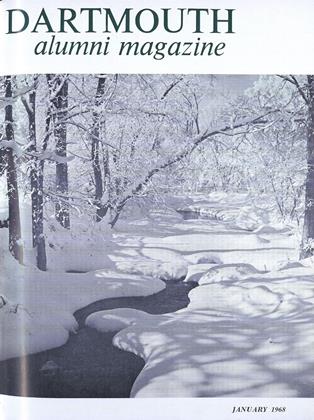THREE CHILDREN OF THE UNIVERSE, EMERSON'S VIEW OF SHAKESPEARE, BACON AND MILTON.
JANUARY 1968 MICHAEL ANDREWS '61THREE CHILDREN OF THE UNIVERSE, EMERSON'S VIEW OF SHAKESPEARE, BACON AND MILTON. MICHAEL ANDREWS '61 JANUARY 1968
By William M.Wynkoop '38. The Hague: Mouton & Co.,1966. 199 pp. 22 Dutch guilders.
The title of Professor Wynkoop's study is taken from a passage in The Poet: "For the Universe has three children, born at one time, which reappear under different names in every system of thought, whether they be called cause, operation and effect; or, more poetically, Jove, Pluto,-and Neptune; or theologically, the Father, the Spirit, and the Son; but which we will call here the Knower, the Doer, and the Sayer. . . . These three are equal. Each is that which he is, essentially, and each of these has the power of the other latent in him and his own patent."
Shakespeare (the Knower), Bacon (the Doer), and Milton (the Sayer) exemplified for Emerson not only the three stages of the English Renaissance, but also the history of the world - the Greek (Classical), Christian (Romantic), and Modern (Reflective or Contemplative); or, theologically, Innocence, the Fall, and Redemption. These stages are duplicated in the life of each individual; "The boy is a Greek; the youth, Romantic; the adult, Reflective." The first period is marked by a fusion of thought and feeling; the second, by the conspicuous absence of such a fusion. In the third, the opposition of Classic and Romantic is resolved into a higher unity.
Shakespeare, with his unified and harmonious vision, represents the first period. He is both Father (the Creator) and Knower (the passive receiver of truth). Bacon, in whose worldly-wise Essays Emerson detected "A mean cunning like the hiss of a snake," exhibited the tension between the physical and the spiritual which marks the second period. In Professor Wynkoop's words, he "manifested not only the opposition of tendencies that were united in Shakespeare and Milton but also action that suggested the Doer and the 'Double Consciousness' accompanying the Fall that occurs on the second stage of moral and religious growth." Milton, in whom "inspiration" replaces the "intellect receptive" of the Knower and the "intellect constructive" of the Doer, reconciles and transcends both.
This is a careful and informative study. It is, however, rather oddly structured. The members of Emerson's universal trinity are, in theory, equal. Yet almost half of ThreeChildren deals with the first-born, Shakespeare; Bacon receives a scant twenty pages, Milton thirty. One also regrets the author's decision to exclude any consideration of the influence of Shakespeare, Bacon and Milton on Emerson's intellectual development.
A specialist in Elizabethan and Jacobeanliterature, Mr. Andrews is Instructor in English at Princeton University.
 View Full Issue
View Full Issue
More From This Issue
-
 Feature
FeatureEmerson at Dartmouth
January 1968 By Michael L. Lasser '57 -
 Feature
FeatureCan Education Kill the Movies?
January 1968 By Maurice Rapf '35 -
 Feature
FeatureA Lifetime of Theater
January 1968 -
 Feature
FeatureAdventures Unlimited
January 1968 -
 Feature
FeaturePolice Commissioner
January 1968 -
 Class Notes
Class Notes1941
January 1968 By EARL H. COTTON, LOUIS A. YOUNG JR.
Books
-
 Books
BooksFACULTY NOTES
MAY 1927 -
 Books
BooksTHE GREAT APES
APRIL 1930 By B. B. Leavitt -
 Books
BooksPOLITICS IN FRANCE.
MARCH 1969 By FRANCOIS DENOEU -
 Books
BooksTOUGH TRIP THROUGH PARADISE.
OCTOBER 1967 By GEORGE O'CONNELL -
 Books
BooksBack To The Land
JUNE 1983 By Jonathan Brownell -
 Books
BooksTurning Pro: Undergraduate writers break into print
OCTOBER 1981 By Robert H. Ross '38

